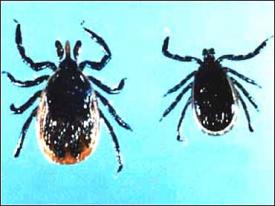NEWS: Researchers decode Lyme disease genome

Research into the genetic makeup of the microbe that causes Lyme disease offers hope for better diagnosis, treatment and possible prevention of the illness. Scientists have completed genetic blueprinting of 13 different strains of the bacteria.
.
From a UMDNJ press release:
Researchers Dr. Steven E. Schutzer of UMDNJ-New Jersey Medical School and Dr. Claire M. Fraser-Liggett of the Institute for Genome Sciences, University of Maryland, and their collaborators have made a major achievement toward better understanding Lyme disease, by determining the complete genetic structures of 13 strains of the bacteria that cause the disease.
These new discoveries may accelerate research efforts to diagnose, prevent and treat the disease, which can affect the nervous system, heart, skin and joints. The occurrence of the disease has grown dramatically over the past ten years in the United States and Europe. The research, which was funded by the National Institutes of Health, has been published online ahead of print in the Journal of Bacteriology.
Dr. Schutzer said, “A driving force for doing this project was the observation that certain forms of the bacteria can be more invasive than others. We wanted to find out why and how to identify this property”.
The authors believe that their sequence information will help investigators design improved diagnostic tests and vaccines. Efficient tests are needed because the telltale rash on the skin does not always appear in infected patients. Cultures, which work well for many other bacteria, take too long to be of immediate use for Lyme bacteria.
Co-author Dr. Benjamin Luft of the Department of Medicine, Stony Brook University-New York, stated, “The field has been bogged down with an incomplete blueprint of the bacteria. With this new blueprint we can now build new tests and treatments.”
Dr. Fraser-Liggett said, “We believe solutions for many of the problems associated with Lyme disease will come from scientific information, beginning with comparative genomics of this organism. Sequencing is a superb discovery tool with greatest impact when coupled with additional biology experiments.”
The research team included Dr. Steven Schutzer of the University of Medicine and Dentistry of New Jersey-New Jersey Medical School; Dr. Claire Fraser-Liggett and Dr. Emmanuel Mongodin of the Institute for Genome Sciences, University of Maryland; Dr. Sherwood Casjens of the Department of Pathology, University of Utah Medical School; Dr. Wei-Gang Qiu of the Department of Biological Sciences, Hunter College of the City University of New York; Dr. John J. Dunn of Brookhaven National Laboratory; and Dr. Benjamin Luft of the Department of Medicine, Stony Brook University-New York.
The University of Medicine and Dentistry of New Jersey (UMDNJ) is the nation’s largest free-standing public health sciences university with more than 6,000 students attending the state’s three medical schools, its only dental school, a graduate school of biomedical sciences, a school of health related professions, a school of nursing and its only school of public health on five campuses. Annually, there are more than two million patient visits at UMDNJ facilities and faculty practices at campuses in Newark, New Brunswick/Piscataway, Scotch Plains, Camden and Stratford. UMDNJ operates University Hospital, a Level I Trauma Center in Newark, and University Behavioral HealthCare, which provides a continuum of healthcare services with multiple locations throughout the state.




















I continue to suffer from unmitigated Neurodermatitis on my scalp from BB.
I was bitten in 1976 with bull's eye rash. went undiagnoised until 2004 have had some treatment but still have the Lyme
Hopefully this will lead to better diagnosis and treatment. Thanks to researchers and doctors who believe that it exists
I AM A 54 YEARS OLD FEMALE. I GOT BITTEN BY A DEAR TICK 10 YEARS AGO ,SINCE THEN MY HEALTH HAS GONE DOWN THE DRAIN. I HAVE BEEN DIAGNOSE WITH FYBROMIALGYA. I ALSO HAS CARPAL TUNNEL IN BOTH HANDS ,FOUR HERNIATED CERVICAL DISCS AND GOING MENOPAUSE,I BELIEVE I ALSO HAVE CHRONIC FATIGUE SYMDROME.I AM ALWAYS IN PAIN IN MY JOINTS AND MY WHOLE BODY. I JUST CAME BACK FROM A SEMINAR HELD BY DR. STEVEN KELLER, ABOUT THE IMMUNE SYSTEM,HE MENTION ABOUT YOUR RESEARCH,I AM SO GLAD TO KNOW THAT YOU ARE DOING THIS RESEARCH…THANK YOU, I WILL BE PRAYING FOR YOU AND THE WHOLE TEAM.